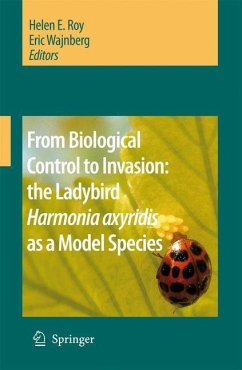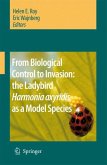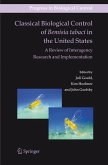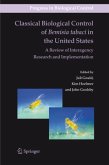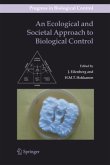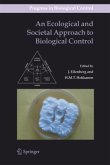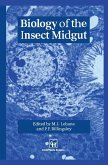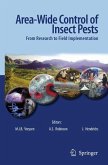From Biological Control to Invasion: the Ladybird Harmonia axyridis as a Model Species
Herausgegeben:Roy, Helen E.; Wajnberg, Eric
From Biological Control to Invasion: the Ladybird Harmonia axyridis as a Model Species
Herausgegeben:Roy, Helen E.; Wajnberg, Eric
- Broschiertes Buch
- Merkliste
- Auf die Merkliste
- Bewerten Bewerten
- Teilen
- Produkt teilen
- Produkterinnerung
- Produkterinnerung
Harmonia axyridis has been described as the "most invasive ladybird on Earth". It has a long history of use as a classical biological control agent in the USA and more recently in Europe. This beetle has been effective at controlling pest insects in a variety of crop systems but it poses unacceptable risks by impacting on non-target species as both an intraguild predator and competitor.
Written by renowned scientists, this book is a synthesis of recent research on H. axyridis and provides informative insights into current perspectives and future directions. Biological control is an…mehr
Andere Kunden interessierten sich auch für
![From Biological Control to Invasion: the Ladybird Harmonia axyridis as a Model Species From Biological Control to Invasion: the Ladybird Harmonia axyridis as a Model Species]() From Biological Control to Invasion: the Ladybird Harmonia axyridis as a Model Species112,99 €
From Biological Control to Invasion: the Ladybird Harmonia axyridis as a Model Species112,99 €![Classical Biological Control of Bemisia tabaci in the United States - A Review of Interagency Research and Implementation Classical Biological Control of Bemisia tabaci in the United States - A Review of Interagency Research and Implementation]() Juli Gould / Kim Hoelmer / John Goolsby (eds.)Classical Biological Control of Bemisia tabaci in the United States - A Review of Interagency Research and Implementation75,99 €
Juli Gould / Kim Hoelmer / John Goolsby (eds.)Classical Biological Control of Bemisia tabaci in the United States - A Review of Interagency Research and Implementation75,99 €![Classical Biological Control of Bemisia tabaci in the United States - A Review of Interagency Research and Implementation Classical Biological Control of Bemisia tabaci in the United States - A Review of Interagency Research and Implementation]() Classical Biological Control of Bemisia tabaci in the United States - A Review of Interagency Research and Implementation75,99 €
Classical Biological Control of Bemisia tabaci in the United States - A Review of Interagency Research and Implementation75,99 €![An Ecological and Societal Approach to Biological Control An Ecological and Societal Approach to Biological Control]() An Ecological and Societal Approach to Biological Control164,99 €
An Ecological and Societal Approach to Biological Control164,99 €![An Ecological and Societal Approach to Biological Control An Ecological and Societal Approach to Biological Control]() J. Eilenberg / H.M.T Hokkanen (eds.)An Ecological and Societal Approach to Biological Control164,99 €
J. Eilenberg / H.M.T Hokkanen (eds.)An Ecological and Societal Approach to Biological Control164,99 €![Biology of the Insect Midgut Biology of the Insect Midgut]() LehaneBiology of the Insect Midgut153,99 €
LehaneBiology of the Insect Midgut153,99 €![Area-Wide Control of Insect Pests Area-Wide Control of Insect Pests]() Area-Wide Control of Insect Pests335,99 €
Area-Wide Control of Insect Pests335,99 €-
-
-
Harmonia axyridis has been described as the "most invasive ladybird on Earth". It has a long history of use as a classical biological control agent in the USA and more recently in Europe. This beetle has been effective at controlling pest insects in a variety of crop systems but it poses unacceptable risks by impacting on non-target species as both an intraguild predator and competitor.
Written by renowned scientists, this book is a synthesis of recent research on H. axyridis and provides informative insights into current perspectives and future directions. Biological control is an essential component of sustainable agriculture but the distinction between a successful biological control agent and an invasive species can be narrow. We hope that lessons can be learnt from H. axyridis.
Written by renowned scientists, this book is a synthesis of recent research on H. axyridis and provides informative insights into current perspectives and future directions. Biological control is an essential component of sustainable agriculture but the distinction between a successful biological control agent and an invasive species can be narrow. We hope that lessons can be learnt from H. axyridis.
Produktdetails
- Produktdetails
- Verlag: Springer / Springer Netherlands
- Artikelnr. des Verlages: 978-90-481-7771-4
- Softcover reprint of hardcover 1st edition 2008
- Seitenzahl: 296
- Erscheinungstermin: 6. November 2010
- Englisch
- Abmessung: 235mm x 155mm x 17mm
- Gewicht: 475g
- ISBN-13: 9789048177714
- ISBN-10: 9048177715
- Artikelnr.: 32108636
- Herstellerkennzeichnung
- Springer-Verlag GmbH
- Tiergartenstr. 17
- 69121 Heidelberg
- ProductSafety@springernature.com
- Verlag: Springer / Springer Netherlands
- Artikelnr. des Verlages: 978-90-481-7771-4
- Softcover reprint of hardcover 1st edition 2008
- Seitenzahl: 296
- Erscheinungstermin: 6. November 2010
- Englisch
- Abmessung: 235mm x 155mm x 17mm
- Gewicht: 475g
- ISBN-13: 9789048177714
- ISBN-10: 9048177715
- Artikelnr.: 32108636
- Herstellerkennzeichnung
- Springer-Verlag GmbH
- Tiergartenstr. 17
- 69121 Heidelberg
- ProductSafety@springernature.com
Dr Helen E. Roy is an ecologist with the NERC - Centre for Ecology and Hydrology in the UK. She has experience in insect ecology and behaviour and has published widely in this field. Specifically her research interests focus on ladybirds and their interactions with other species including pathogenic fungi. Over the past 14 years Helen has studied such intraguild interactions within the context of biological control. She is currently the convenor of the IOBC WPRS (International Organisation of Biological Control) study group on Beneifits and Risks associated with Exotic Biological Control Agents. Dr Éric Wajnberg is a population biologist specialised in population genetics, behavioural ecology and statistical modelling. He develops theoretical approaches - mainly based on Monte Carlo simulations - and experiments are conducted in order to verify the predictions obtained. He is also an expert in biological control (past Secretary General of the International Organisation of Biological Control - IOBC), with more than 20 years of work with insect parasitoids. He has already published several books on the use of insect parasitoids in biological control programmes against crop pests.
From biological control to invasion: the ladybird Harmonia axyridis as a model species.- Harmonia axyridis in Europe: spread and distribution of a non-native coccinellid.- Bad side of a good beetle: the North American experience with Harmonia axyridis.- Harmonia axyridis: an environmental risk assessment for Northwest Europe.- Harmonia axyridis in Great Britain: analysis of the spread and distribution of a non-native coccinellid.- Invasion history, habitat preferences and phenology of the invasive ladybird Harmonia axyridis in Belgium.- Phenotypic variation in invasive and biocontrol populations of the harlequin ladybird, Harmonia axyridis.- Predicting the potential geographical distribution of the harlequin ladybird, Harmonia axyridis, using the CLIMEX model.- Harmonia axyridis: What will stop the invader?.- Intraguild predation involving Harmonia axyridis: a review of current knowledge and future perspectives.- Intraguild predation of immature stages of British and Japanese coccinellids by the invasive ladybird Harmonia axyridis.- Chemical protection of Calvia quatuordecimguttata eggs against intraguild predation by the invasive ladybird Harmonia axyridis.- Pollen as an alternative food for Harmonia axyridis.- Influence of diet and photoperiod on development and reproduction of European populations of Harmonia axyridis (Pallas) (Coleoptera: Coccinellidae).- Ladybird population dynamics in potato: comparison of native species with an invasive species, Harmonia axyridis.- Current and potential management strategies against Harmonia axyridis.- Interactions between the parasitoid wasp Dinocampus coccinellae and two species of coccinellid from Japan and Britain.- Interactions between the fungal pathogen Beauveria bassiana and three species of coccinellid: Harmonia axyridis, Coccinella septempunctata and Adalia bipunctata.- Estimation of mortality by entomophages on exotic Harmonia axyridis versus native Adalia bipunctata in semi-field conditions in northern Italy.
From biological control to invasion: the ladybird Harmonia axyridis as a model species.- Harmonia axyridis in Europe: spread and distribution of a non-native coccinellid.- Bad side of a good beetle: the North American experience with Harmonia axyridis.- Harmonia axyridis: an environmental risk assessment for Northwest Europe.- Harmonia axyridis in Great Britain: analysis of the spread and distribution of a non-native coccinellid.- Invasion history, habitat preferences and phenology of the invasive ladybird Harmonia axyridis in Belgium.- Phenotypic variation in invasive and biocontrol populations of the harlequin ladybird, Harmonia axyridis.- Predicting the potential geographical distribution of the harlequin ladybird, Harmonia axyridis, using the CLIMEX model.- Harmonia axyridis: What will stop the invader?.- Intraguild predation involving Harmonia axyridis: a review of current knowledge and future perspectives.- Intraguild predation of immature stages of British and Japanese coccinellids by the invasive ladybird Harmonia axyridis.- Chemical protection of Calvia quatuordecimguttata eggs against intraguild predation by the invasive ladybird Harmonia axyridis.- Pollen as an alternative food for Harmonia axyridis.- Influence of diet and photoperiod on development and reproduction of European populations of Harmonia axyridis (Pallas) (Coleoptera: Coccinellidae).- Ladybird population dynamics in potato: comparison of native species with an invasive species, Harmonia axyridis.- Current and potential management strategies against Harmonia axyridis.- Interactions between the parasitoid wasp Dinocampus coccinellae and two species of coccinellid from Japan and Britain.- Interactions between the fungal pathogen Beauveria bassiana and three species of coccinellid: Harmonia axyridis, Coccinella septempunctata and Adalia bipunctata.- Estimation of mortality by entomophages on exotic Harmonia axyridis versus native Adalia bipunctata in semi-field conditions in northern Italy.

